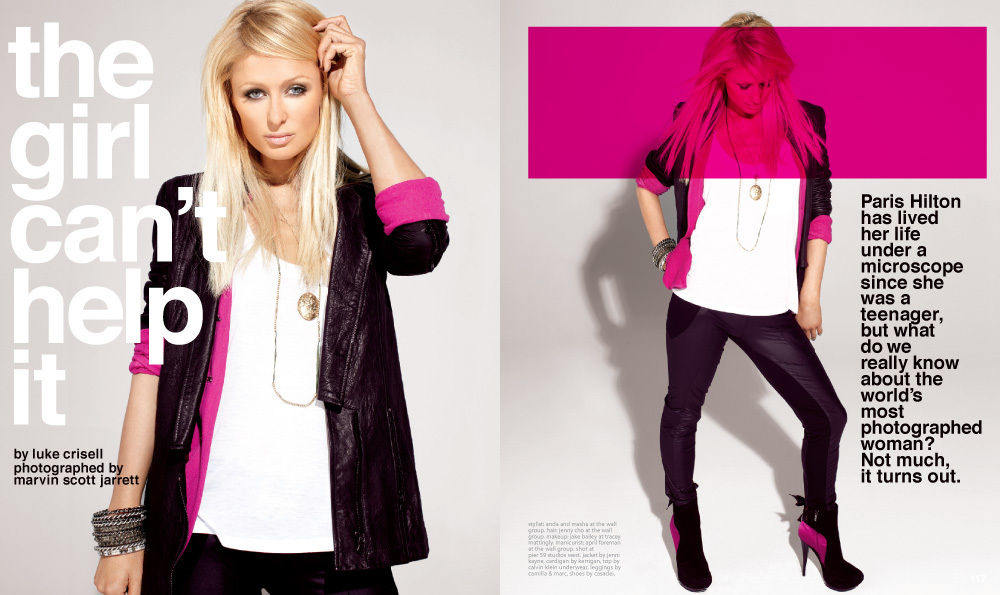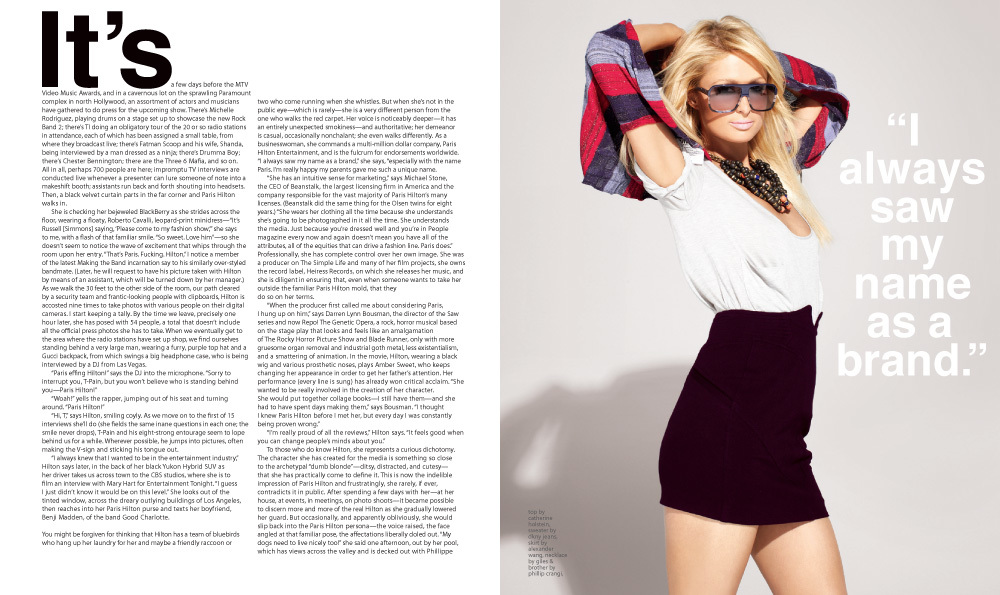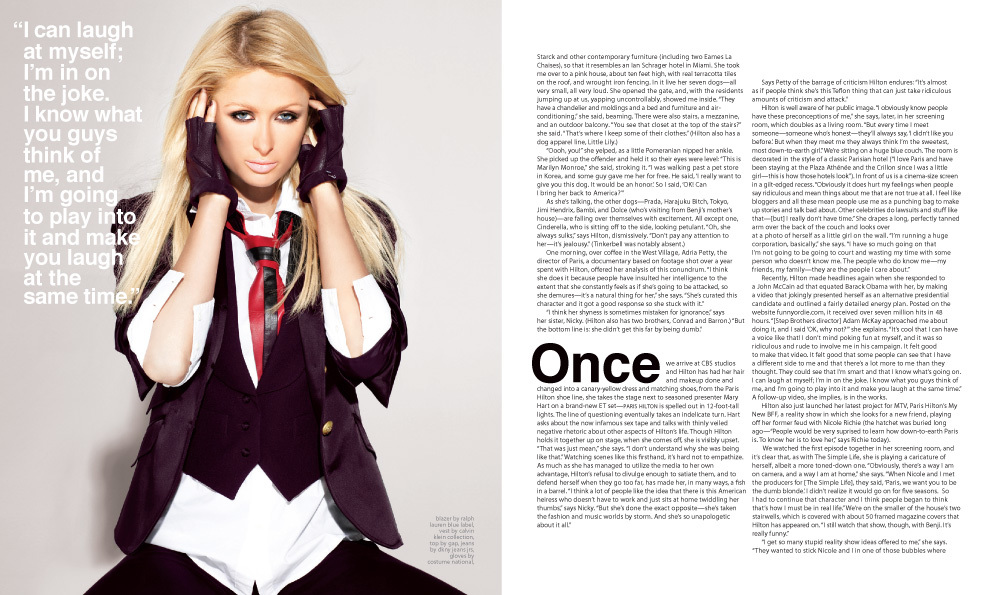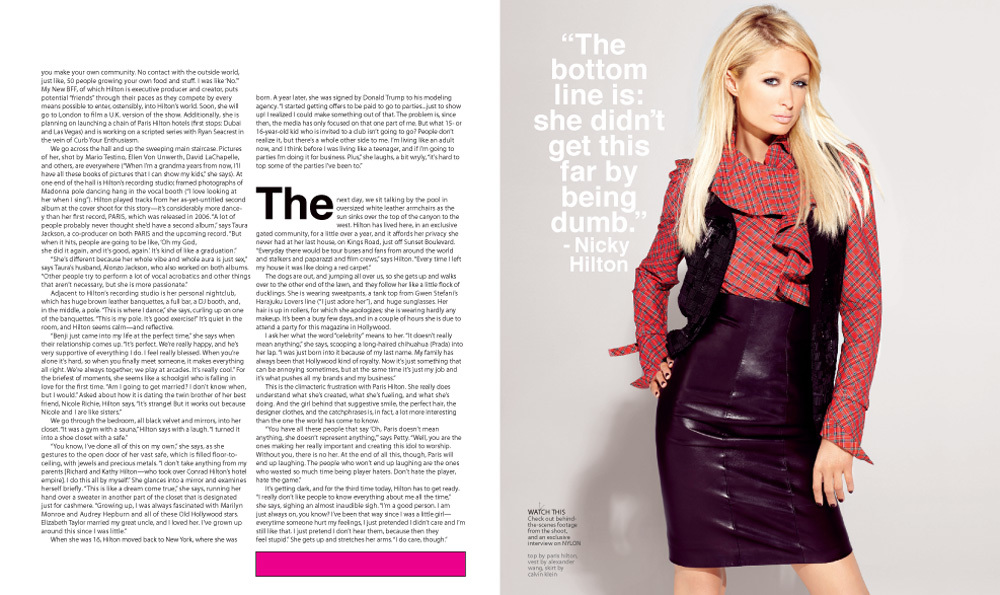IT’S A FEW days before the MTV Video Music Awards, and in a cavernous lot on the sprawling Paramount complex in north Hollywood, an assortment of actors and musicians have gathered to do press for the upcoming show. There’s Michelle Rodriguez, playing drums on a stage set up to showcase the new Rock Band 2; there’s TI doing an obligatory tour of the 20 or so radio stations in attendance, each of which has been assigned a small table, from where they broadcast live; there’s Fatman Scoop and his wife, Shanda, being interviewed by a man dressed as a ninja; there’s Drumma Boy; there’s Chester Bennington; there are the Three 6 Mafia, and so on.
All in all, perhaps 700 people are here; impromptu TV interviews are conducted live whenever a presenter can lure someone of note into a makeshift booth; assistants run back and forth shouting into headsets. Then, a black velvet curtain parts in the far corner and Paris Hilton walks in.
She is checking her bejeweled BlackBerry as she strides across the floor, wearing a floaty, Roberto Cavalli, leopard-print minidress—“It’s Russell [Simmons] saying, ‘Please come to my fashion show,’” she says to me, with a flash of that familiar smile. “So sweet. Love him”—so she doesn’t seem to notice the wave of excitement that whips through the room upon her entry. “That’s Paris. Fucking. Hilton,” I notice a member of the latest Making the Band incarnation say to his similarly over-styled bandmate. (Later, he will request to have his picture taken with Hilton by means of an assistant, which will be turned down by her manager.) As we walk the 30 feet to the other side of the room, our path cleared by a security team and frantic-looking people with clipboards, Hilton is accosted nine times to take photos with various people on their digital cameras. I start keeping a tally. By the time we leave, precisely one hour later, she has posed with 54 people, a total that doesn’t include all the official press photos she has to take. When we eventually get to the area where the radio stations have set up shop, we find ourselves standing behind a very large man, wearing a furry, purple top hat and a Gucci backpack, from which swings a big headphone case, who is being interviewed by a DJ from Las Vegas.
“Paris effing Hilton!” says the DJ into the microphone. “Sorry to interrupt you, T-Pain, but you won’t believe who is standing behind you—Paris Hilton!”
“Woah!” yells the rapper, jumping out of his seat and turning around. “Paris Hilton!”
“Hi, T,” says Hilton, smiling coyly. As we move on to the first of 15 interviews she’ll do (she fields the same inane questions in each one; the smile never drops), T-Pain and his eight-strong entourage seem to lope behind us for a while. Wherever possible, he jumps into pictures, often making the V-sign and sticking his tongue out. “I always knew that I wanted to be in the entertainment industry,” Hilton says later, in the back of her black Yukon Hybrid SUV as her driver takes us across town to the CBS studios, where she is to film an interview with Mary Hart for Entertainment Tonight. “I guess I just didn’t know it would be on this level.” She looks out of the tinted window, across the dreary outlying buildings of Los Angeles, then reaches into her Paris Hilton purse and texts her boyfriend, Benji Madden, of the band Good Charlotte.
You might be forgiven for thinking that Hilton has a team of bluebirds who hang up her laundry for her and maybe a friendly raccoon or two who come running when she whistles. But when she’s not in the public eye—which is rarely—she is a very different person from the one who walks the red carpet. Her voice is noticeably deeper—it has an entirely unexpected smokiness—and authoritative; her demeanor is casual, occasionally nonchalant; she even walks differently. As a businesswoman, she commands a multi-million dollar company, Paris Hilton Entertainment, and is the fulcrum for endorsements worldwide. “I always saw my name as a brand,” she says, “especially with the name Paris. I’m really happy my parents gave me such a unique name.
“She has an intuitive sense for marketing,” says Michael Stone, the CEO of Beanstalk, the largest licensing firm in America and the company responsible for the vast majority of Paris Hilton’s many licenses. (Beanstalk did the same thing for the Olsen twins for eight years.) “She wears her clothing all the time because she understands she’s going to be photographed in it all the time. She understands the media. Just because you’re dressed well and you’re in People magazine every now and again doesn’t mean you have all of the attributes, all of the equities that can drive a fashion line. Paris does.” Professionally, she has complete control over her own image. She was a producer on The Simple Life and many of her film projects, she owns the record label, Heiress Records, on which she releases her music, and she is diligent in ensuring that, even when someone wants to take her outside the familiar Paris Hilton mold, that they do so on her terms. “When the producer first called me about considering Paris, I hung up on him,” says Darren Lynn Bousman, the director of the Saw series and now Repo! The Genetic Opera, a rock, horror musical based on the stage play that looks and feels like an amalgamation of The Rocky Horror Picture Show and Blade Runner, only with more gruesome organ removal and industrial goth metal, less existentialism, and a smattering of animation. In the movie, Hilton, wearing a black wig and various prosthetic noses, plays Amber Sweet, who keeps changing her appearance in order to get her father’s attention. Her performance (every line is sung) has already won critical acclaim. “She wanted to be really involved in the creation of her character. She would put together collage books—I still have them—and she had to have spent days making them,” says Bousman. “I thought I knew Paris Hilton before I met her, but every day I was constantly being proven wrong.”
“I’m really proud of all the reviews,” Hilton says. “It feels good when you can change people’s minds about you.”
To those who do know Hilton, she represents a curious dichotomy. The character she has created for the media is something so close to the archetypal “dumb blonde”—ditsy, distracted, and cutesy— that she has practically come to define it. This is now the indelible impression of Paris Hilton and frustratingly, she rarely, if ever, contradicts it in public. After spending a few days with her—at her house, at events, in meetings, on photo shoots—it became possible to discern more and more of the real Hilton as she gradually lowered her guard. But occasionally, and apparently obliviously, she would slip back into the Paris Hilton persona—the voice raised, the face angled at that familiar pose, the affectations liberally doled out. “My dogs need to live nicely too!” she said one afternoon, out by her pool, which has views across the valley and is decked out with Phillippe Starck and other contemporary furniture (including two Eames La Chaises), so that it resembles an Ian Schrager hotel in Miami. She took me over to a pink house, about ten feet high, with real terracotta tiles on the roof, and wrought iron fencing. In it live her seven dogs—all very small, all very loud. She opened the gate, and, with the residents jumping up at us, yapping uncontrollably, showed me inside. “They have a chandelier and moldings and a bed and furniture and air- conditioning,” she said, beaming. There were also stairs, a mezzanine, and an outdoor balcony. “You see that closet at the top of the stairs?” she said. “That’s where I keep some of their clothes.” (Hilton also has a dog apparel line, Little Lily.)
“Oooh, you!” she yelped, as a little Pomeranian nipped her ankle. She picked up the offender and held it so their eyes were level: “This is Marilyn Monroe,” she said, stroking it. “I was walking past a pet store in Korea, and some guy gave me her for free. He said, ‘I really want to give you this dog. It would be an honor.’ So I said, ‘OK! Can I bring her back to America?’”
As she’s talking, the other dogs—Prada, Harajuku Bitch, Tokyo, Jimi Hendrix, Bambi, and Dolce (who’s visiting from Benji’s mother’s house)—are falling over themselves with excitement. All except one, Cinderella, who is sitting off to the side, looking petulant. “Oh, she always sulks,” says Hilton, dismissively. “Don’t pay any attention to her—it’s jealousy.” (Tinkerbell was notably absent.)
One morning, over coffee in the West Village, Adria Petty, the director of Paris, a documentary based on footage shot over a year spent with Hilton, offered her analysis of this conundrum.
“I think she does it because people have insulted her intelligence to the extent that she constantly feels as if she’s going to be attacked, so she demures—it’s a natural thing for her,” she says. “She’s curated this character and it got a good response so she stuck with it.” “I think her shyness is sometimes mistaken for ignorance,” says her sister, Nicky. (Hilton also has two brothers, Conrad and Barron.) “But the bottom line is: she didn’t get this far by being dumb.”
ONCE WE ARRIVE at CBS studios and Hilton has had her hair and makeup done and changed into a canary-yellow dress and matching shoes, from the Paris Hilton shoe line, she takes the stage next to seasoned presenter Mary Hart on a brand-new ET set—Paris Hilton is spelled out in 12-foot-tall lights. The line of questioning eventually takes an indelicate turn. Hart asks about the now infamous sex tape and talks with thinly veiled negative rhetoric about other aspects of Hilton’s life. Though Hilton holds it together up on stage, when she comes off, she is visibly upset. “That was just mean,” she says. “I don’t understand why she was being like that.” Watching scenes like this firsthand, it’s hard not to empathize. As much as she has managed to utilize the media to her own advantage, Hilton’s refusal to divulge enough to satiate them, and to defend herself when they go too far, has made her, in many ways, a fish in a barrel. “I think a lot of people like the idea that there is this American heiress who doesn’t have to work and just sits at home twiddling her thumbs,” says Nicky. “But she’s done the exact opposite—she’s taken the fashion and music worlds by storm. And she’s so unapologetic about it all.” Says Petty of the barrage of criticism Hilton endures: “It’s almost as if people think she’s this Teflon thing that can just take ridiculous amounts of criticism and attack.”
Hilton is well aware of her public image. “I obviously know people have these preconceptions of me,” she says, later, in her screening room, which doubles as a living room. “But every time I meet someone—someone who’s honest—they’ll always say, ‘I didn’t like you before.’ But when they meet me they always think I’m the sweetest, most down-to-earth girl.” We’re sitting on a huge blue couch. The room is decorated in the style of a classic Parisian hotel (“I love Paris and have been staying at the Plaza Athénée and the Crillon since I was a little girl—this is how those hotels look”). In front of us is a cinema-size screen in a gilt-edged recess. “Obviously it does hurt my feelings when people say ridiculous and mean things about me that are not true at all. I feel like bloggers and all these mean people use me as a punching bag to make up stories and talk bad about. Other celebrities do lawsuits and stuff like that—[but] I really don’t have time.” She drapes along, perfectly tanned arm over the back of the couch and looks over at a photo of herself as a little girl on the wall. “I’m running a huge corporation, basically,” she says. “I have so much going on that I’m not going to be going to court and wasting my time with some person who doesn’t know me. The people who do know me—my friends, my family—they are the people I care about.”
Recently, Hilton made headlines again when she responded to a John McCain ad that equated Barack Obama with her, by making a video that jokingly presented herself as an alternative presidential candidate and outlined a fairly detailed energy plan. Posted on the website funnyordie.com, it received over seven million hits in 48 hours. “[Step Brothers director] Adam McKay approached me about doing it, and I said ‘OK, why not?’’’ she explains. “It’s cool that I can have a voice like that! I don’t mind poking fun at myself, and it was so ridiculous and rude to involve me in his campaign. It felt good to make that video. It felt good that some people can see that I have a different side to me and that there’s a lot more to me than they thought. They could see that I’m smart and that I know what’s going on. I can laugh at myself; I’m in on the joke. I know what you guys think of me, and I’m going to play into it and make you laugh at the same time.” A follow-up video, she implies, is in the works.
Hilton also just launched her latest project for MTV, Paris Hilton’s My New BFF, a reality show in which she looks for a new friend, playing off her former feud with Nicole Richie (the hatchet was buried long ago—“People would be very surprised to learn how down-to-earth Paris is. To know her is to love her,” says Richie today).
We watched the first episode together in her screening room, and it’s clear that, as with The Simple Life, she is playing a caricature of herself, albeit a more toned-down one. “Obviously, there’s a way I am on camera, and a way I am at home,” she says. “When Nicole and I met the producers for [The Simple Life], they said, ‘Paris, we want you to be the dumb blonde.’ I didn’t realize it would go on for five seasons. So I had to continue that character and I think people began to think that’s how I must be in real life.” We’re on the smaller of the house’s two stairwells, which is covered with about 50 framed magazine covers that Hilton has appeared on. “I still watch that show, though, with Benji. It’s really funny.”
“I get so many stupid reality show ideas offered to me,” she says. “They wanted to stick Nicole and I in one of those bubbles where you make your own community. No contact with the outside world, just like, 50 people growing your own food and stuff. I was like ‘No.’” My New BFF, of which Hilton is executive producer and creator, puts potential “friends” through their paces as they compete by every means possible to enter, ostensibly, into Hilton’s world. Soon, she will go to London to film a U.K. version of the show. Additionally, she is planning on launching a chain of Paris Hilton hotels (first stops: Dubai and Las Vegas) and is working on a scripted series with Ryan Seacrest in the vein of Curb Your Enthusiasm.
We go across the hall and up the sweeping main staircase. Pictures of her, shot by Mario Testino, Ellen Von Unwerth, David LaChapelle, and others, are everywhere (“When I’m a grandma years from now, I’ll have all these books of pictures that I can show my kids,” she says). At one end of the hall is Hilton’s recording studio; framed photographs of Madonna pole dancing hang in the vocal booth (“I love looking at her when I sing”). Hilton played tracks from her as-yet-untitled second album at the cover shoot for this story—it’s considerably more dance- y than her first record, PARIS, which was released in 2006. “A lot of people probably never thought she’d have a second album,” says Taura Jackson, a co-producer on both PARIS and the upcoming record. “But when it hits, people are going to be like, ‘Oh my God, she did it again, and it’s good, again.’ It’s kind of like a graduation.”
“She’s different because her whole vibe and whole aura is just sex,” says Taura’s husband, Alonzo Jackson, who also worked on both albums. “Other people try to perform a lot of vocal acrobatics and other things that aren’t necessary, but she is more passionate.”
Adjacent to Hilton’s recording studio is her personal nightclub, which has huge brown leather banquettes, a full bar, a DJ booth, and, in the middle, a pole. “This is where I dance,” she says, curling up on one of the banquettes. “This is my pole. It’s good exercise!” It’s quiet in the room, and Hilton seems calm—and reflective.
“Benji just came into my life at the perfect time,” she says when their relationship comes up. “It’s perfect. We’re really happy, and he’s very supportive of everything I do. I feel really blessed. When you’re alone it’s hard, so when you finally meet someone, it makes everything all right. We’re always together; we play at arcades. It’s really cool.” For the briefest of moments, she seems like a schoolgirl who is falling in love for the first time. “Am I going to get married? I don’t know when, but I would.” Asked about how it is dating the twin brother of her best friend, Nicole Richie, Hilton says, “It’s strange! But it works out because Nicole and I are like sisters.”
We go through the bedroom, all black velvet and mirrors, into her closet. “It was a gym with a sauna,” Hilton says with a laugh. “I turned it into a shoe closet with a safe.”
“You know, I’ve done all of this on my own,” she says, as she gestures to the open door of her vast safe, which is filled floor-to- ceiling, with jewels and precious metals. “I don’t take anything from my parents [Richard and Kathy Hilton—who took over Conrad Hilton’s hotel empire]. I do this all by myself.” She glances into a mirror and examines herself briefly. “This is like a dream come true,” she says, running her hand over a sweater in another part of the closet that is designated just for cashmere. “Growing up, I was always fascinated with Marilyn Monroe and Audrey Hepburn and all of these Old Hollywood stars. Elizabeth Taylor married my great uncle, and I loved her. I’ve grown up around this since I was little.”
When she was 16, Hilton moved back to New York, where she was born. A year later, she was signed by Donald Trump to his modeling agency. “I started getting offers to be paid to go to parties...just to show up! I realized I could make something out of that. The problem is, since then, the media has only focused on that one part of me. But what 15- or 16-year-old kid who is invited to a club isn’t going to go? People don’t realize it, but there’s a whole other side to me. I’m living like an adult now, and I think before I was living like a teenager, and if I’m going to parties I’m doing it for business. Plus,” she laughs, a bit wryly, “it’s hard to top some of the parties I’ve been to.”
THE NEXT DAY, we sit talking by the pool in oversized white leather armchairs as the sun sinks over the top of the canyon to the west. Hilton has lived here, in an exclusive gated community, for a little over a year, and it affords her privacy she never had at her last house, on Kings Road, just off Sunset Boulevard. “Everyday there would be tour buses and fans from around the world and stalkers and paparazzi and film crews,” says Hilton. “Every time I left my house it was like doing a red carpet.”
The dogs are out, and jumping all over us, so she gets up and walks over to the other end of the lawn, and they follow her like a little flock of ducklings. She is wearing sweatpants, a tank top from Gwen Stefani’s Harajuku Lovers line (“I just adore her”), and huge sunglasses. Her hair is up in rollers, for which she apologizes; she is wearing hardly any makeup. It’s been a busy few days, and in a couple of hours she is due to attend a party for this magazine in Hollywood.
I ask her what the word “celebrity” means to her. “It doesn’t really mean anything,” she says, scooping a long-haired chihuahua (Prada) into her lap. “I was just born into it because of my last name. My family has always been that Hollywood kind of royalty. Now it’s just something that can be annoying sometimes, but at the same time it’s just my job and it’s what pushes all my brands and my business.” This is the climacteric frustration with Paris Hilton. She really does understand what she’s created, what she’s fueling, and what she’s doing. And the girl behind that suggestive smile, the perfect hair, the designer clothes, and the catchphrases is, in fact, a lot more interesting than the one the world has come to know.
“You have all these people that say ‘Oh, Paris doesn’t mean anything, she doesn’t represent anything,’” says Petty. “Well, you are the ones making her really important and creating this idol to worship. Without you, there is no her. At the end of all this, though, Paris will end up laughing. The people who won’t end up laughing are the ones who wasted so much time being player haters. Don’t hate the player, hate the game.”
It’s getting dark, and for the third time today, Hilton has to get ready. “I really don’t like people to know everything about me all the time,” she says, sighing an almost inaudible sigh. “I’m a good person. I am just always on, you know? I’ve been that way since I was a little girl—every time someone hurt my feelings, I just pretended I didn’t care and I’m still like that. I just pretend I don’t hear them, because then they feel stupid.” She gets up and stretches her arms. “I do care, though.”



